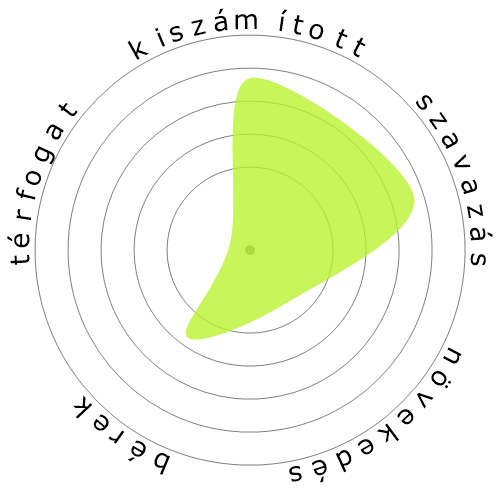Zenei igazgatók és zeneszerzők




Az emberek ezt is megtekintették
Számított automatizálási kockázat
Alacsony kockázat (21-40%): Ennél a szintnél a munkák csak korlátozottan vannak kitéve az automatizálás veszélyének, mivel ezek a pozíciók technikai és emberközpontú készségek kombinációját igénylik.
További információ arról, hogy mi ez a pontszám, és hogyan számítják ki, elérhető itt.
Felhasználói szavazás
A látogatóink szerint alacsony az esélye annak, hogy ezt a foglalkozást automatizálni fogják. Ezt az értékelést tovább erősíti a kiszámított automatizálási kockázati szint, amely 21% esélyt becsül az automatizálásra.
Mit gondol, milyen kockázatai vannak az automatizációnak?
Milyen valószínűséggel fogják Zenei igazgatók és zeneszerzők robotok vagy mesterséges intelligencia helyettesíteni a következő 20 évben?
Érzelem
A következő grafikon mindenhol szerepel, ahol jelentős mennyiségű szavazat áll rendelkezésre, hogy értelmes adatokat lehessen megjeleníteni. Ezek a vizuális ábrázolások az időbeli felhasználói szavazási eredményeket mutatják, jelentős jelzést adva a hangulat trendjeiről.
Érzelem az időben (évente)
Növekedés
A(z) 'Music Directors and Composers' munkahelyi nyitások száma várhatóan 2,7%-kal nő 2033-ra.
Teljes foglalkoztatottság és becsült állásnyitások
A frissített előrejelzések 09-2025 időpontban esedékesek..
Bérek
A(z) 2023-ban a 'Music Directors and Composers' éves középfizetése 62 590 $ volt, vagyis 30 $ óránként.
'Music Directors and Composers' magasabb összeget kaptak, mint az országos mediánbér, ami 48 060 $-n állt.
Bérek az idők folyamán
Térfogat
2023 időpontjában 10 770 ember dolgozott 'Music Directors and Composers' munkakörben az Egyesült Államokban.
Ez körülbelül a < 0,001% -át képviseli az országban foglalkoztatott munkaerőnek.
Másképp fogalmazva, körülbelül minden 14 ezer. ember 'Music Directors and Composers'-ként dolgozik.
Munkaköri leírás
Vezesse, irányítsa, tervezze és vezesse a zenei előadók vagy csoportok, például zenekarok, bandák, kórusok és dalárda klubok hangszeres vagy vokális előadásait; vagy hozzon létre eredeti zenei műveket.
SOC Code: 27-2041.00


Megjegyzések
Leave a comment
This is without taking into account all of the interpersonal elements of composition, which are also not well understood by people who don't do this work.
Finally, given that humans are subject to copyright law and that the level of imitation and inspiration from previous works is controlled and limited by these laws, it is unlikely that music created by AI that was not drastically reshaped by a human composer would avoid copyright lawsuits or be subject to copyright itself, as current technology in this field only knows how to aggregate and make stylistic choices based on probability. A human composer is not going to waste time fiddling with AI compositions to "get them there" when they could just write something themselves.
Show me an evangelist who actually produces music and isn't heavily invested in AI themselves in some way, and I'll reconsider.
bye bye dutse, hesh and koot
1. Which is understanding which part of what they created did a human like and thus may have trouble using reinforced learning.
2. Lyrics have meaning behind the words. Its much more complex than just a melody. Its these lyrics and building melody in combination with lyrics which is going to be rather difficult but not impossible. Lyric writing is going to be one of the Last things AI will be able to do.
https://www.youtube.com/watch?v=wYb3Wimn01s
Hagyjon egy választ erről a foglalkozásról